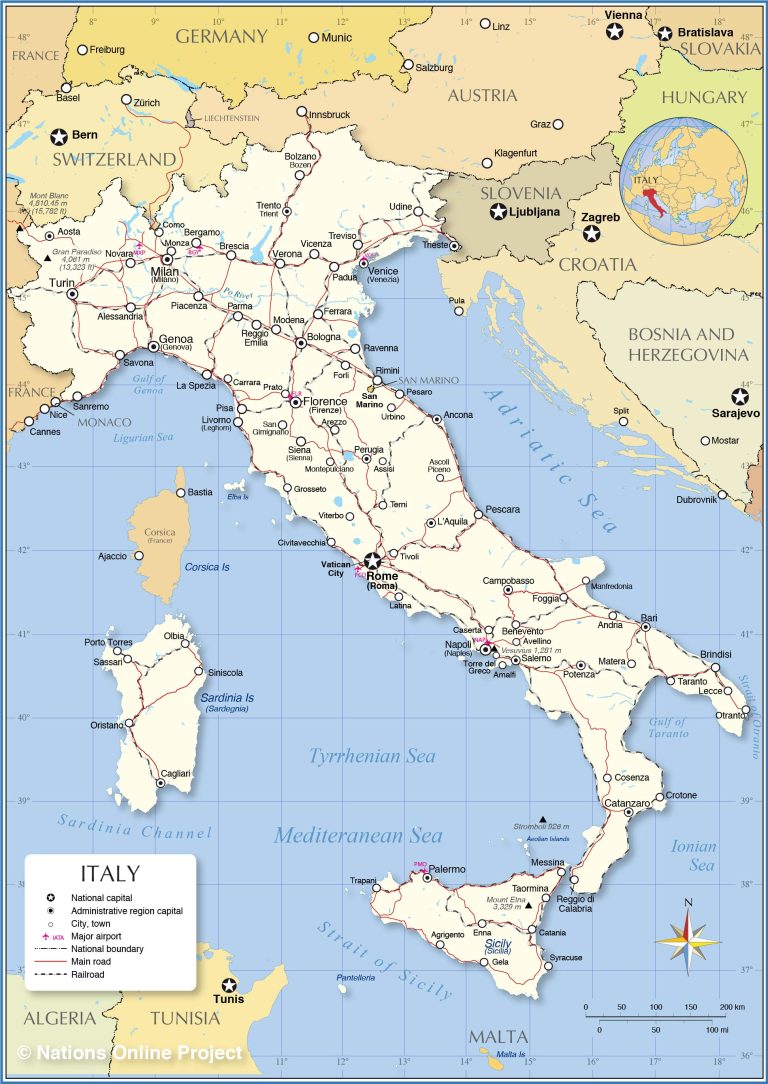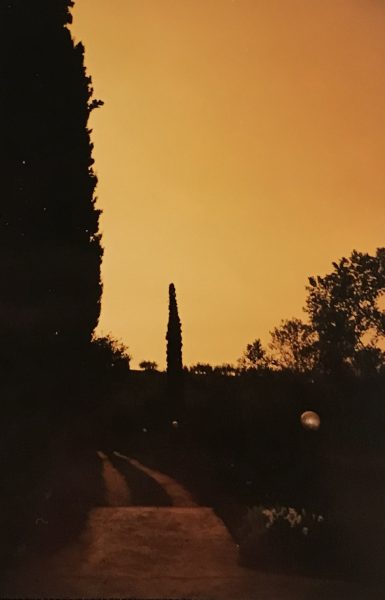#49: Italy, January – June 2002
Snow, Scirocco and Sri Lanka
While traveling here, there and everywhere during the first half of 2002, we also managed to make it through being snowed in, the “second wave” of foreigners buying up local property, Africa’s scirocco coating everything in red dust, another interior renovation, plus lots more. Here are excerpts from monthly letters to family.
As always, you can click on photos and graphics to enlarge them.
January
We woke up on the 15th, looked out the window and couldn’t see. “Heavy fog,” we thought. Then we got up, put on our glasses and looked again. It was heavy snow. So heavy we 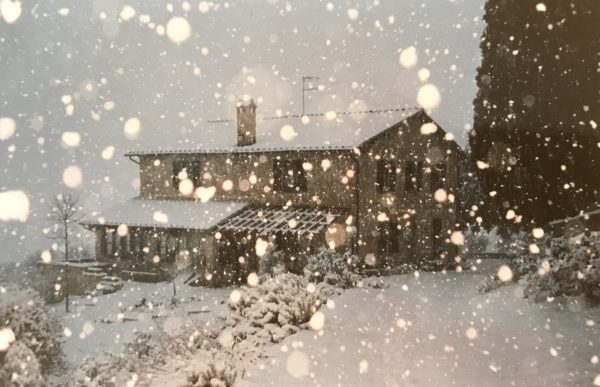 couldn’t get out of here for 24 hours. We normally have a powder-sugar dusting once or twice a year, usually gone by 10 a.m. This time it snowed several inches and drifted higher. Our lane to the communal dirt road is on the north side and shaded; no one around here has snow-removal equipment. So we waited until the sun came out the next day before attempting to drive. Once we were able to get up our lane, we found snow and ice on asphalt roads on hills’ north sides. Our lane was still icy five days later.
couldn’t get out of here for 24 hours. We normally have a powder-sugar dusting once or twice a year, usually gone by 10 a.m. This time it snowed several inches and drifted higher. Our lane to the communal dirt road is on the north side and shaded; no one around here has snow-removal equipment. So we waited until the sun came out the next day before attempting to drive. Once we were able to get up our lane, we found snow and ice on asphalt roads on hills’ north sides. Our lane was still icy five days later.
I’ve decided to restructure the first half of my book. I mentioned this to my Iowa instructor via email, and she wrote back with great encouragement. Onward and upward…
Russell’s been invited to spend six weeks in Japan at Nagoya University’s Graduate School of International Development, conducting a workshop on law in development, participate in symposia and do research on the Japanese Government’s new foreign aid policy. Leaves mid-February, back late March.
February
R was experiencing spells of wooziness and headache starting about two weeks before his departure to Japan. Series of doctor visits in Amelia, Terni’s regional hospital and in Rome. All tests showed nothing to cause this. Docs thought it might be indoor environment, because he felt better when outside, so they said probably better to get out of here. Russell took off a day late and is now doing fine.
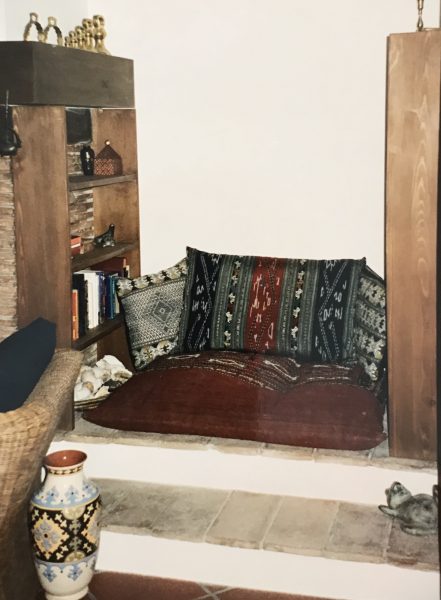 In the meantime, before R left, we started our annual house project. This time, we’re closing up a door between the cantina (now a utility room) and the living room (formerly a stable). We haven’t used that door in five years, and a wall would be more useful. Now, on the cantina side, there’s an extended coat rack, and on the living room side, there’s a little reading nook with bookshelves and Central Asian cushions on the platform which led to the old door.
In the meantime, before R left, we started our annual house project. This time, we’re closing up a door between the cantina (now a utility room) and the living room (formerly a stable). We haven’t used that door in five years, and a wall would be more useful. Now, on the cantina side, there’s an extended coat rack, and on the living room side, there’s a little reading nook with bookshelves and Central Asian cushions on the platform which led to the old door.
While Russell’s gone, I’ve asked old friend Graziano to come once a week for some outside chores. He’s clearing the detritus of winter, helping make some new flower beds, etc. etc. I’ve also been pruning olive trees, a few everyday, as a break from writing. It’s good exercise, with an esthetic aspect (which I enjoy). I’m doing the younger trees; G will do the tall, old ones.
March
Fox scat and porcupine quills on morning Zack-walks, raucous squawk of a male pheasant in the afternoon, harvesting our own lemons for dinner and making kumquat compote with our own fruit. Spring has sprung in Umbria, and it’s lovely all day long.
However, the rains have failed, and it’s looking very bad for anyone who’s growing anything. I’ve already started watering the garden, a full two-months early. Neighbor Paolo came with his backhoe to dig the pond deeper. It never filled this year; deepening it brought in more of the available ground water. Hoping to be able to use the pond to water vegetable and flower gardens until perhaps mid-summer.
Russell returns on the 31st.
You’ve probably heard of the scirocco, the hot wind that blows out of Africa and across southern Europe. Often, it’s a rain-bringer and contributes to our mild winters. But this month, it was a dust-bringer. About mid-morning on the 11th, we looked out the window because it had suddenly grown dark. The driveway lights even tried to come on! We could see a golden-red cloud coming rapidly out of the southwest. Then it started to rain across the valley. We got only a few drops that spotted the leaves, but later in Amelia, I saw cars streaked with wet, red dust carried all the way across the Mediterranean from the Sahara. Absolutely extraordinary.
We’re so far out in the country that we can easily see the conjunction of Mercury, Venus, Mars, Jupiter and Saturn. Not long after sunset every evening, just to the right of Orion. Sort of magical and awe-inspiring — easy to understand how people long ago were fascinated by the night sky.
Discovered a nursery which specializes in plants that grow naturally in this climate. So we bought over 30 plants — wild sweet peas, honeysuckle, artemisia, Greek peony, prostrate rosemary, euphorbia, phloxes, budelia, achillea (yarrow in a striking terra cotta color), teucrium and many more. Most are in the ground now, but others will be planted if/when the fall rains come.
May
Many invitations this month, one of which turned out to be interesting in a rather negative way. A couple who’ve only recently moved to the Amelia area decided to host a large luncheon of English-speaking couples who are new to the region. We and a few others were included to represent the “old hands.” R&I came away feeling we’d seen the beginning of the “second wave.” At least that’s our term for it, although it’s a phenomenon that’s been written about and discussed before. The first foreigners to move in, whether it’s Italy, France or elsewhere, tend to do so because they love the country, the people, the food, etc. They like the towns just the way they are and are happy to become a part of the life as is. Then articles start to be written, and tourists start to arrive in larger and larger numbers. Next, a new type of person begins to buy property, wildly driving up prices, because they want to be where it’s trendy. That’s what we experienced at this luncheon — not newcomers who love Amelia and the Amerini the way they are, but people who want to complain and change things. Among other complaints, they kept talking about how Italians are always out to cheat and do shoddy work. You know from our letters that we have not had that experience at all. Well, I’ve gone on too long about this, but it was a depressing lunch — the new guard ain’t like the old guard (imagine that the latter term now includes us!), and all we can do is hope there won’t be so many of them that they’ll turn Amelia into a place that distrusts foreigners because they behave so badly. Those of you who are candle-lighters, please do so now.
On a happier note, let me talk about getting your hair done in Amelia. I haven’t been to an American beauty parlor in ages, so I don’t know how things are done there now, but my recent visit to the parrucchiere (pah-rue-key-eh-ray; literally “wig-agent,” but now “hair salon.”) reminded me of another reason why I’m glad to live here. I go every six weeks for a trim, so there’s always time enough to forget the pleasure that awaits me. The shampoo is like shampoos just about everywhere. But after they put on the conditioner, the customer gets a five-minute massage of head and neck. I can’t tell you what bliss it is to just recline there and have someone gently rub away the stress of the day. The only thing comparable I can remember is having my hair done in Bangkok. There, they had me lie down on a high bed for the shampoo while someone washed my feet and massaged them with perfumed oil. (Such foot treatment makes great sense in the tropics, where sandals are the norm.)
June
Russell’s in Sri Lanka! It all happened on very short notice. Just before we headed north to Trent (more on this, below), he got a call from the U.N. Development Program in New York, asking if he’d be available to go to Colombo to advise the government on foreign investment now that the peace accord ending the 20-year civil war has been signed. He said he’d be interested and gave them contact coordinates for while we’d be gone. They phoned him in Trent, confirming they’d like him to come ASAP, so he got in touch with American Express travel division, worked out an itinerary and left 36 hours after we returned home. I’ve received a couple emails since he arrived, and all seems to be going very well. He’ll spend a week there, then fly back to Rome on the morning of August 7.
Now, let me back up to the beginning of the month…
Years ago, when we lived in East Africa, Russell directed a production of Noel Coward’s Nude with Violin for the local amateur theater. I had a minor role, a member of the Russian nobility down on her luck and reduced to living in North Africa. The only lines I remember are: “You ever been Bou Sada? Well, don’ go. Is ruined now.” And that, dear ones, is how we felt about Cinque Terre (cheen-kway tay-ray).
All our lives, we’ve heard reports of how wonderful this part of Italy is. Unfortunately, so has everyone else. What had been five small fishing villages tucked into the folds of mountains falling into the sea are now tourist traps filled with day-trippers, gimcracks, 10,000 tee-shirts and a zillion racks of shiny postcards. Not to mention lots of cheap restaurants with poor food and several expensive restaurants with poor food. That having been said, the setting is still spectacular, and the towns are lovely from the sea.
What I most enjoyed were our two trips by boat along the coast, one putting in at each of the villages, the other circling some off-lying islands. I also enjoyed a quiet morning exploring the medieval town of Levanto on foot. Our three guests from Sacramento hiked high up along the coast, reporting that as their highlight.
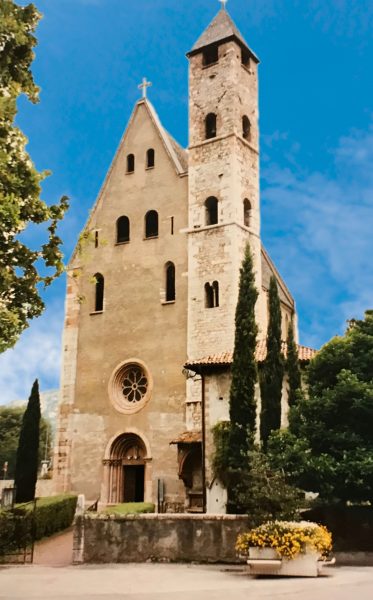 Later in the month, we took the train to Trento (“Trent” in English; as in The Council of Trent), where Russell had been invited to conduct a workshop for an international law institute, introducing their Ph.D. students to some of the basics of technical assistance. Most of the trip was a repetition of other journeys we’d taken, but once we entered the valley of the Adige (“ah-dee-jay”) River, it was a whole new experience. High rock walls dropped hundreds of feet from Dolomite peaks down to the valley floor, a landscape so different from Umbria that we felt we’d entered another country. Even the architecture was different, more Germanic, less Italian.
Later in the month, we took the train to Trento (“Trent” in English; as in The Council of Trent), where Russell had been invited to conduct a workshop for an international law institute, introducing their Ph.D. students to some of the basics of technical assistance. Most of the trip was a repetition of other journeys we’d taken, but once we entered the valley of the Adige (“ah-dee-jay”) River, it was a whole new experience. High rock walls dropped hundreds of feet from Dolomite peaks down to the valley floor, a landscape so different from Umbria that we felt we’d entered another country. Even the architecture was different, more Germanic, less Italian.
We both enjoyed Trent very much. Founded by classical Romans, the city’s foundations can still be seen under part of the cathedral. Much of the medieval and Renaissance town is still standing, so a walking tour is delightful. I found a wonderful castle and the aforementioned cathedral, begun in the 13th century. It was here that most of the meetings of the 18-year-long Council of Trent were held in an effort to counter the growth of Protestantism. There are also lots of fascinating museums — church history, art, natural history and daily life, to name a few. And just looking in the shop windows was lots of fun.
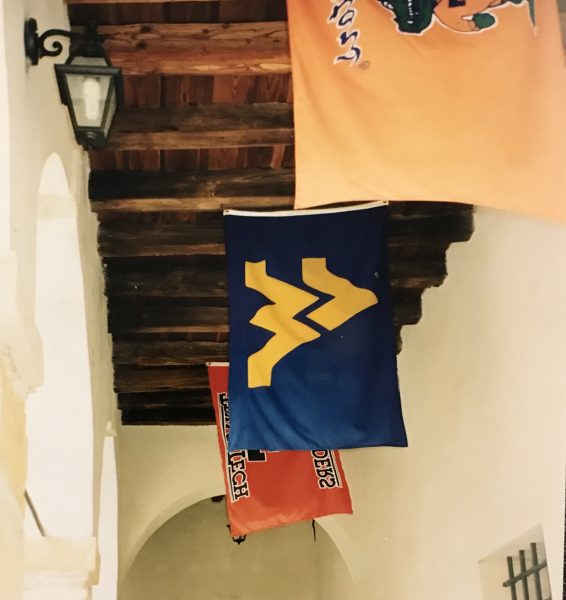 After R’s workshop, we went on to Asolo (“ah-sow-low”), a spectacular train trip in a valley like a knife-cut through the mountains, lined with water-weathered stone. Asolo hosts an institute which offers training in international business administration. The leadership wanted to talk with RBS about the possibility of future collaboration. The institute is backed by a consortium of 29 American universities, including West Virginia, Clemson and Iowa State.
After R’s workshop, we went on to Asolo (“ah-sow-low”), a spectacular train trip in a valley like a knife-cut through the mountains, lined with water-weathered stone. Asolo hosts an institute which offers training in international business administration. The leadership wanted to talk with RBS about the possibility of future collaboration. The institute is backed by a consortium of 29 American universities, including West Virginia, Clemson and Iowa State.
While Russell was in meetings, I wandered around the town, which has had lots of famous residents, including Robert Browning and Eleonora Duse, to name just two (photo of her house enclosed). There’s also a castle in the historical center and a fort high on the hill above, as well as a museum (open only on the weekends, alas). I also managed to edit three chapters of my book, so I felt productive as well as entertained.
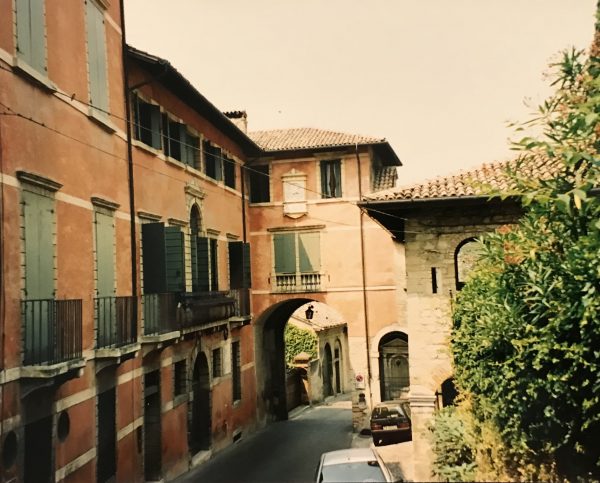 Somewhere in the middle of all this activity, the call to come to Colombo intervened, and we planned to rush home and get everything ready for Russell’s departure. The institute sent a taxi to take us to the train station, but when we got there, no train was listed! At the very last minute, we learned that the train to Padua, for which we had tickets, was really a bus leaving from across the street. We ran out and boarded just in time.
Somewhere in the middle of all this activity, the call to come to Colombo intervened, and we planned to rush home and get everything ready for Russell’s departure. The institute sent a taxi to take us to the train station, but when we got there, no train was listed! At the very last minute, we learned that the train to Padua, for which we had tickets, was really a bus leaving from across the street. We ran out and boarded just in time.
The bus started out of town, only to be caught in a huge traffic jam because of a road accident. Apparently no one had been hurt, but the drivers were so mad, they refused to clear their cars from the stream of traffic. We sat there for well over half an hour until the cops arrived to tell them to move. A few more miles down the road was another accident. Bottom line: we arrived in Padua too late to catch the express train to Orte (“or-tay”), our station. So we had to take the milk run to Bologna and change there. We finally arrived three hours late — so much for hoping to get a load of laundry done before bedtime.
Somehow, it all worked out the next day — three loads of laundry, Russell’s inoculations for the trip, ironing and packing. The next morning, I drove R to Orte to catch a train that left at 9:35 for the Rome Airport. I dropped him off and went to park the car. When I returned to the station at 9:16, there was no Russell and no train! I wandered around the station, thinking he might have gone to the men’s room or the coffee bar. I checked the electronic display — no mention of train to airport. I checked the bulletin board listing all trains in and out of Orte, and there it said the train to the airport left at 9:14. The penny dropped — Russell must have entered the station just in time to see that the Internet timetable was wrong and then run for the correct train. When I asked the ticket seller about “a tall American with a beard going to Fiumicino,” he excitedly replied. “Si, si. He was running for Track 5!” I hung out a bit longer in case the tall American had broken an ankle running for Track 5, but everything seemed calm, so I headed off for my own day’s errands.
**********
A couple of footnotes:
The Rome Airport has many appellations. No one in Italy said, “The Rome Airport.” I just used that term to be clear to readers of our monthly letter. The official name was Leonardo da Vinci Airport, in honor of the man whom many consider the father of aviation. But it’s located just outside the little town of Fiumicino (“fee-oo-me-chee-no”), which is why the Italians all refer to the airport as I did in last paragraph above, “…going to Fiumicino…”
People often ask us what the international life was like. That crazy schedule of phone calls with a message to come ASAP, messed-up transport and just barely getting laundry and packing done in time was typical for both of us, whether living in the States or Italy. I’ve lost count of how many times each of us managed to survive the same necessity for coping with stress and finding a way around the challenges. I must add, though, that, like most people in the international life, we thrived on those challenges. Risk and problem-solving nurture us.

COMING NEXT MONTH
#50: Italy, July – November 2002
30th anniversary at Lake Como.
Russell returning to Sri Lanka for two years.
Who’ll keep the home fires burning?

LET ME HEAR FROM YOU.
Please take a moment to share your thoughts.
Your comments help make the blog better, and I always answer.
* * *
If you enjoyed reading this post, I hope you’ll SUBSCRIBE by clicking on the button below. Every month, when I post a new excerpt from my life overseas, you’ll get an email with a link so you can read the next installment. Subscription is free, and I won’t share your contact information with anyone else. Your subscribing lets me know you’re reading what I write, and that means a lot.

